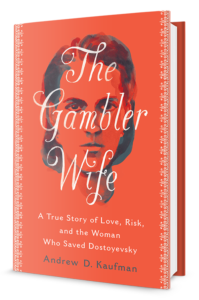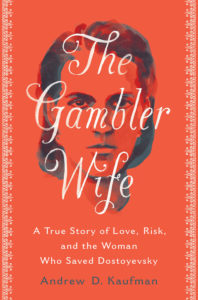Dostoyevsky’s Honeymoon to Forget Is Fascinating. Read On…
Honeymoon Drama – Dostoyevsky and Anna
Every vacation has its highs and lows, even a honeymoon. But you’d be hard-pressed to find a honeymoon with more drama than the trip taken by Fyodor Dostoyevsky and his new wife, Anna, soon after their marriage in 1867. What was meant to be a three-month getaway abroad for the new couple turned into a four-year odyssey that pushed them both to their limits, threatening both their physical and mental health, their relationship, and even their ability to return home to Russia.
I delved into this incredible story in my newest book, The Gambler Wife: A True Story of Love, Risk, and the Woman Who Saved Dostoyevsky, which will be published this summer. I’m excited to introduce more people to Anna Dostoyevskaya, a woman who was well ahead of her time and instrumental to the creation of several of Dostoyevsky’s timeless novels.
The two met a few years after the death of Dostoyevsky’s first wife, Marya. He was struggling to finish a novella called The Gambler with a looming deadline, and a colleague suggested hiring a stenographer to help him finish. A recommendation from a friend led to the 20-year-old Anna Snitkina being hired to lend a hand. The relationship soon blossomed, as Anna became his trusted first reader, a confidant, an inspiration, and eventually his wife and business partner.
But while they would ultimately find great success together, the start of their relationship was hampered by an untenable situation at home. Dostoyevsky was living with his 19-year-old stepson, Pasha, who was determined to make life as difficult as possible for the new lady of the house. Dostoyevsky was also supporting the family of his brother, Mikhail, who’d died the same year as his former wife.
Though on the brink of bankruptcy himself, Dostoyevsky was committed to these obligations. The money he earned from the success of Crime and Punishment, which was published serially in 1866, the year before his marriage to Anna, was enough to avoid bankruptcy, but not enough to pay off all his creditors.
An advance for his next novel, however–to be called The Idiot–looked to be enough to allow the newlyweds to move ahead with a honeymoon abroad. The relatives he was supporting had other plans. Both his stepson and his brother’s widow refused to allow him to leave without extravagant payments to them in advance.
He had a hard time saying no to them and initially sided with them in canceling the trip.

To Honeymoon or Not?
“Fate is against us, my darling Anyechka,” he said to Anna. “If only you knew how badly I feel that this cannot happen now! How I’ve dreamed of this trip, how necessary I felt it was for both of us!”
But Anna wasn’t one to let her new relatives control the destiny of her marriage. After much thought, she decided this trip was important enough that she should sell her dowry to raise the money herself. Dostoyevsky rejected the idea, refusing to allow her to sacrifice her possessions. They argued, with her “begging him to let me have at least two or three months of a calm and happy life,” and he refused to give an inch.
Anna recalled how she “burst into such violent sobbing that poor Fyodor Mikhailovich was at last taken aback.” Which, as I write in the book, must have been exactly what she intended: she needed him to hear the violence of her frustration, to understand what might happen if he didn’t agree to her plan.
With a kind of composed ferocity, she choked out how hard these weeks had been for her, and begged him to give them the few months of calm they needed. For under the present conditions, she made clear, “we not only would never become friends, as we used to dream, but would perhaps separate forever. “I implored him to save our love, our happiness.”
The dramatic gambit worked. Dostoyevsky relented and agreed to the trip.
An Odyssey that Changed Literary History
Of course, little did she know what awaited her. The three-month honeymoon in which they could escape their intrusive family, work on the next book, and get to know each other better would not go as planned. Instead, Anna would quickly discover that her husband had a crippling gambling addiction, a possible secret lover, and so much debt that it threatened their ability to ever return home.
As I said, it’s quite the story.
It’s tempting to end the tale of their honeymoon with the message: “be careful what you wish for.” But while filled with tragic elements, the trip also cemented their relationship, and in the end, helped the two build on each other’s strengths to overcome the staggering obstacles in their way.
Dostoyevsky often needed to teeter on the edge of destruction in order to tap into his deepest emotional and creative instincts, while Anna was most resourceful in moments of extreme urgency, or when helping Dostoyevsky channel his frenetic creative energy.
The honeymoon trip may have gone far differently than expected, but it was crucial to helping Dostoyevsky overcome both personal and creative demons, enabling him — with the help of Anna — to emerge as one of the world’s greatest writers.
***
Connect with Dr. Kaufman on Amazon, Twitter, Facebook, LinkedIn, Instagram, or YouTube, and sign up for his newsletter here.
Follow Books Behind Bars on Twitter and Facebook.
Preorder The Gambler Wife: A True Story of Love, Risk, and the Woman Who Saved Dostoyevsky
Mailing List
To receive monthly articles, inspiration, and updates, including updates about Andy's new book, The Gambler Wife: A True Story of Love, Risk, and the Woman Who Saved Dostoyevsky, please fill out the form below.

